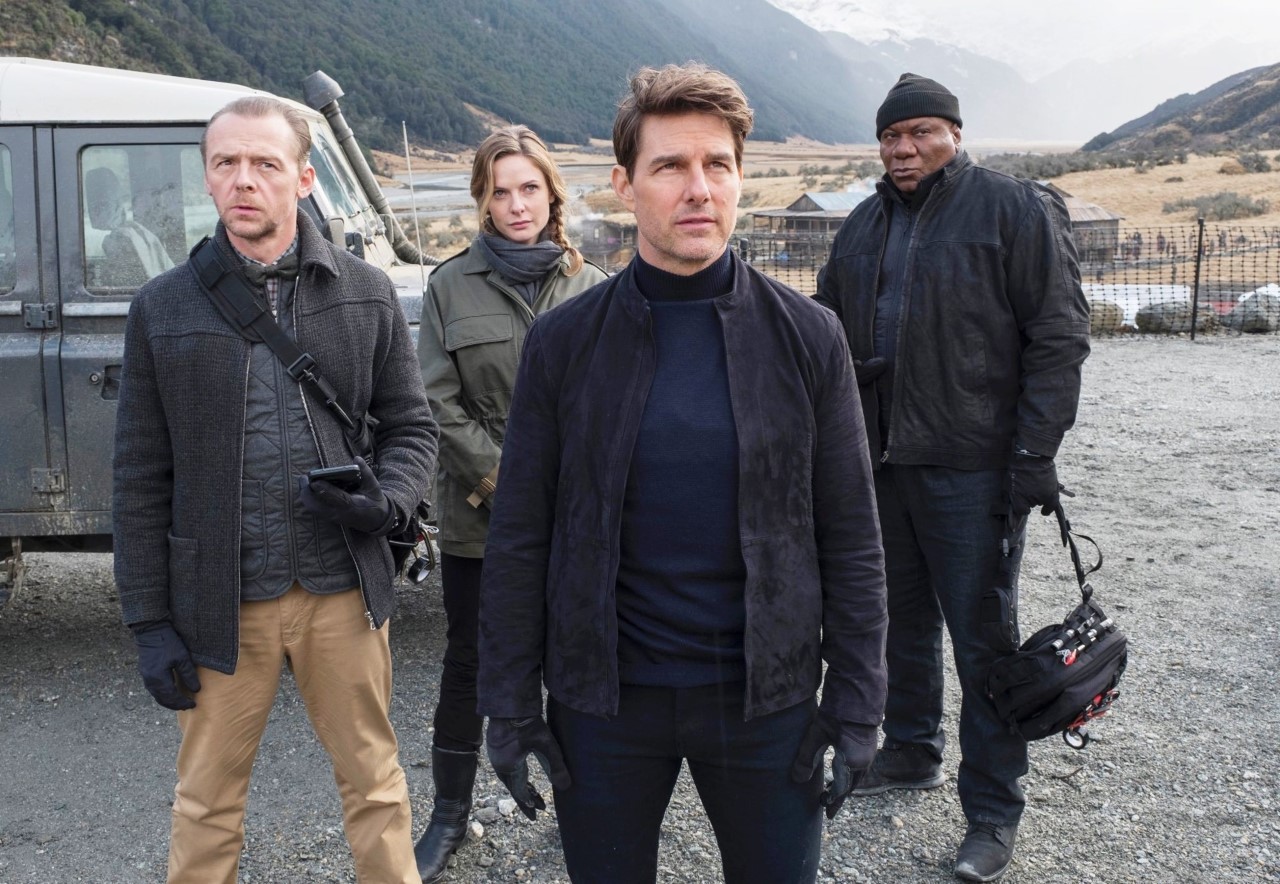Good guy Ethan Hunt has never been one to run from trouble, but even he may have doubts about his latest assignment.
It began when he agreed to try to stop a terrorist group – the same one that already sparked a regional smallpox outbreak – from acquiring plutonium for nuclear weapons. But when Plan A went awry, he had to resort to Plan B, which involved infiltrating the terrorist network and pretending to be the lead buyer of plutonium.
Ethan Hunt – a terrorist who purchases nuclear bombs? Say it ain’t so! Of course, it’s for a good cause: saving humanity and keeping the weapons from the bad guys.
And somehow, he’s still hoping to maintain his ethics and morals, which includes his No. 1 rule: no innocent bloodshed.
Mission: Impossible – Fallout (PG-13) opens this weekend, starring Tom Cruise as Ethan Hunt, Ving Rhames as his partner Luther, Simon Pegg as his other partner Benji, Henry Cavill as CIA operative August Walker and Alec Baldwin as IMF secretary Alan Hunley.
It is the sixth installment in the Mission: Impossible film series, which launched in 1996 and tells the story of Hunt, an agent within an anti-crime U.S. government body known as the Impossible Missions Force (IMF) who is given only the most difficult of assignments.
In Fallout, Hunt discovers that the only way he can prevent a nuclear holocaust is to pretend to be a murdering terrorist.
It’s one of the most entertaining action films I’ve watched – with wall-to-wall chases and cliffhangers (some literal ones) around every corner – but it’s marred by strong language and more violence than I’d want my tween son to see. Hunt, though, provides us an example of an action hero with a solid moral compass.
Let’s examine the details
Warning: minor/moderate spoilers!
(Scale key: Minimal, moderate, extreme)
Coarse Language
Moderate. About 33 words: s—t (7), h-ll (7), SOB (4), d—n (4), OMG (3), misuse of “God” (2), misuse of “Jesus” (2), a— (2), f-word (1), misuse of “Jesus Christ” (1).
Violence/Disturbing
Extreme. Expect a gunfight or hand-to-hand fisticuffs every five minutes, with plenty of bodies on the ground (Although it stays somewhat bloodless). We see Hunt and his sidekicks get into a gun fight underground with the bad guys. Hunt tasers someone in the neck. Minutes later, Hunt and Walker get into a bathroom fight with someone. Mirrors are broken. Sinks are broken. A plumbing pipe is used as a weapon. A man is shot in the face (We don’t see it, but we do see blood on the floor). Hunt and a woman stab several people with knives when attacked. A woman is run over by a motorcycle but survives. Terrorists plot to kill cops to help a friend escape (The plan fails). A man nearly drowns in a vehicle. Helicopters crash; we see a victim with a mutilated side of his face. A man nearly dies while hanging. Another man is strangled to death.
Sexuality/Sensuality/Nudity
Minimal. Two people kiss.
Other Positive Elements
If only Jack Bauer of 24 fame were as driven to do the right thing. Hunt saves someone who tried to kill him. He refuses to let a friend get killed – even though the action might have saved millions of lives. When he learns the bad guys may kill a dozen or so people, he does everything he can to stop it – despite the fact that doing so might blow his cover.
Other Stuff You Might Want To Know
We see men (from behind) using the restroom.
Life Lessons
Most of us are able to sleep at night in peace without worrying about crime or terrorism. That’s because brave men and women – law enforcement and military personnel, for example – put their lives on the line for our safety. Sure, the Mission: Impossible series is all about action and excitement, but it’s also about self-sacrifice and putting others first – two things Hunt and his teammates do on a regular basis. For families who enjoy the series, that’s a topic worth discussing.
Worldview/Ethics
Ethan Hunt has a weakness. Or is it a strength? It is this: He refuses to let anyone die – especially innocent people and his teammates – if they can be saved. That gets him in trouble with his bosses early in the movie when he opts to save his friends instead of capturing the plutonium. Does the world need people who “care about the one life as much as they care about the millions” – as his boss describes it? Of course it does. But is that a good trait for counter-terrorism officials? In the television series 24, Jack Bauer was known to take drastic actions – even killing friends – when multiple lives were at risk. In Fallout, Hunt does just the opposite and tries his hardest to save everyone. It’s the film’s dominant theme. I enjoyed watching Jack Bauer on TV, but Hollywood needs more action heroes like Ethan Hunt. .
What Works
The action. The cinematography. The chase scenes. Fallout has some of the most exhilarating car chase scenes I’ve witnessed. The fact that it all takes place in Paris and London only adds to the enjoyment.
What Doesn’t
The movie’s final scenes. There’s no way they got all that done in 15 minutes, as presented. Still, it was fun to watch.
Discussion Questions
- Is it always right to “care about the one life” as much as you “care about the millions”? How does that play out in government? Law enforcement? The military? Was Hunt always right?
- What did you think about the arrangement Hunt and his wife had made? How does that square with Scripture?
- What can you do to encourage any military personnel or law enforcement officials you know?
Entertainment rating: 3.5 out of 5 stars. Family-friendly rating: 2.5 out of 5 stars.
Rated PG-13 for violence and intense sequences of action, and for brief strong language.
